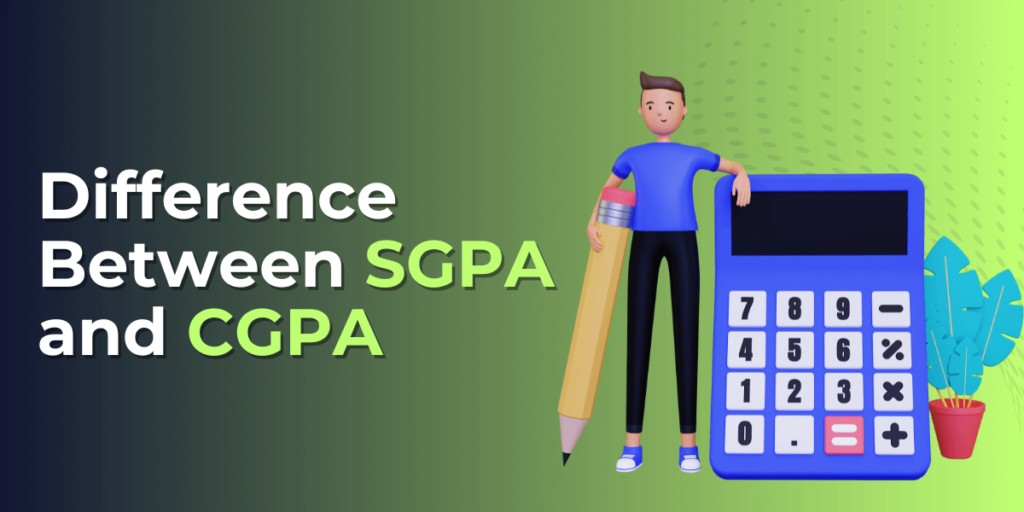Difference Between SGPA and CGPA: Understanding Grading Systems in Education
Students are frequently graded and assessed in the academic setting utilising a variety of grading systems based on their academic performance. The SGPA (Semester Grade Point Average) and CGPA (Cumulative Grade Point Average) are two such systems that are frequently used in educational institutions. These grading systems serve as numerical indicators of a student’s academic progress, but they vary in their applicability, their methods of calculation, and the time spans they cover. In order to fully comprehend the importance of SGPA and CGPA in the educational environment, we examine their main differences in this article.
Definition and Scope:
Semester Grade Point Average (SGPA): SGPA is a measurement of academic performance across a semester. As the name implies, it is a system of grades used to evaluate a student’s academic progress over the course of a single semester or academic term. Students receive their SGPA, a numerical reflection of their performance throughout the course of the semester, which is normally six months long, at the conclusion of each term.
Cumulative Grade Point Average (CGPA):CGPA is the acronym for grade point average. In contrast to SGPA, CGPA considers a student’s overall academic achievement over a longer time period, typically the whole length of their academic career. To arrive at a comprehensive evaluation of a student’s academic excellence, it considers the SGPA of each semester.
Read Our Blog: What is SGPA and CGPA
Calculation Method:
Calculating SGPA: A student’s SGPA is determined by taking into account both their course credits and grades from a single semester. According to the difficulty and significance of each course, a specific number of credits is assigned to it. A grade point on a preset scale, such as the 4-point scale (A = 4, B = 3, C = 2, D = 1, F = 0), is then calculated based on the student’s performance in each course. By dividing the sum of (credit points * grade points) for all courses by the total number of credits attempted in that semester, the SGPA Calculator.
Calculating the CGPA: Each semester’s SGPA is taken into account while calculating the CGPA. the total credits attempted in the semester, the cumulative grade points obtained from all semesters.
Period of Evaluation:
SGPA: At the conclusion of each semester, a student’s SGPA is calculated and awarded, giving them timely feedback on how they performed throughout that particular academic term. It enables them to pinpoint their areas of weakness and make the required corrections in later semesters.
CGPA: The CGPA Calculator, on the other hand, depicts a student’s entire academic performance from the start of their academic career to the present. It considers the SGPA of all semesters, providing a thorough picture of a student’s development during the duration of their studies.
Significance and Application:
SGPA: SGPA is essential for evaluating a student’s performance in a condensed amount of time. It is frequently employed to establish eligibility for financial aid, academic honours, and specific academic opportunities like internships or research projects. For students to continue their studies in succeeding semesters or to avoid academic probation, several institutions also impose minimum SGPA standards.
CGPA: Because it measures a student’s entire academic performance, the CGPA has more significant ramifications. When making admissions and hiring decisions, many higher education institutions and employers take CGPA into account. A high CGPA can lead to more favourable employment prospects, scholarships for graduate school, and other academic honours . It can also be used to gauge a student’s commitment and consistency over the course of their academic career.
Flexibility and Adaptability:
SGPA: Because it only takes into account performance from a single semester, the SGPA is rigid. Due to the lack of consideration for students’ achievement in previous semesters, this rigidity may be useful for those who may have experienced difficulties in a specific semester. It also indicates that a student’s entire academic success will not be dramatically impacted by one excellent semester’s performance.
CGPA: Because it is cumulative, the CGPA offers a more adaptable and flexible assessment of a student’s academic progress. It enables students to show growth over time, and great results in subsequent semesters might make up for poor results in the beginning of their degree.
Conclusion
When evaluating a student’s academic achievement at educational institutions, both SGPA and CGPA are essential instruments. The CGPA provides a holistic picture of a student’s overall academic path, whereas the SGPA provides a more detailed review for each semester. Students, instructors, and employers can better appreciate the complexities of academic evaluations and base judgments on the findings gained by understanding the differences between various grading systems. Ultimately, a student’s educational route and future activities are greatly influenced by both their SGPA and CGPA.





